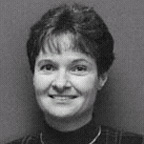
After earning a degree from Millikin University, Coppernoll began her nursing career as an instructor at Methodist Medical Center School of Nursing, which she found to be right up her alley. "Nursing as a profession involves a tremendous amount of teaching, so the switch from teaching patients to teaching nursing students was natural," she said.
Coppernoll suspended her career after the birth of her first child, but got back into teaching when a friend asked her to teach childbirth classes for couples anticipating a cesarean birth. "I taught those classes for about five years on a part-time basis. During that time, I was asked to serve on a panel that was planning a sexuality education program for youth and parents. It was from that experience that I became aware of the need for quality, responsible sexuality education."
Her newfound interest in sexuality education led her to Children’s Home, where she volunteered as a facilitator for their "How to Say No" program conducted in schools for grades six through nine. After one year of volunteering, she decided to go back to graduate school to expand her background in health education, with a focus on sexuality education.
Coppernoll accepted a position with Hult Health Education Center, a not-for-profit, private organization, when it opened in 1990. "The Center is an outgrowth of former Mayor Jim Maloof’s ‘Forward Peoria’ program, started in 1986. One of the committees formed by the program conducted a needs survey of schools and churches within a 100-mile radius of Peoria. Findings confirmed the need for a comprehensive health education program to supplement the efforts of parents, schools, civic groups, youth organizations, social service agencies, and health care providers. Ground was broken for Hult Center in 1989," she said.
Coppernoll explained the Center promotes healthy lifestyles to people of all ages, but her focus is mainly on youth. As the curriculum coordinator, she’s responsible for developing classes and programs for school-aged children. "The concept behind the Center is to deliver information in an imaginative and captivating manner. Since most people are visual learners, the high-impact, interactive exhibits and instruction tools at the Center provide an ideal learning environment. As one of our junior high students put it, ‘You set up something that’s boring to learn about into something that was interesting.’"
In addition to in-house instruction, some programs are provided on an outreach basis. The Center’s programs fall into one of four categories: substance abuse prevention, family life education, nutrition, and general health. Coppernoll puts her graduate training in sexuality education to work in the many workshops she conducts on the topic. "Like all educators on staff, I’m involved in teaching a variety of programs on a day-to-day basis. I also keep our curriculum up to date, which involves keeping the staff informed of current trends, issues, and statistics within the field. I’ve also been heavily involved with various research projects in which the Center has participated, including one now that deals with children’s mental health," she said.
Coppernoll said her job is satisfying not only because of her passion for what she teaches, but also because of the people she meets and works with every day. We have a tremendous staff here, and it really is a team effort. Everyone—our custodian, two office personnel, six educators, and executive director—plays an important role in fulfilling our mission. Interacting with students is also one of the best parts of my work. You never know what students will say or do. For instance, one of our instructors held up a plastic model of cauliflower, and asked a group of second graders what the food was. One of the little boys replied, ‘white broccoli.’"
With the diverse people she encounters, she said there’s never a dull day on the job. "Even though our programs are repeated from one group to the next, since no two groups are alike, each program is new and different. I have also met and worked with some outstanding schoolteachers. Teaching today, especially in some of the inner city public schools, is very challenging, and I’m impressed with the skills and dedication in many of the teachers I’ve seen."
Because much of her job revolves around effecting behavioral change, Coppernoll said she sometimes runs into difficulties in getting people interested in new ways of doing things. "Providing information is important, but we must also help people relate the value of changing behavior to their own lives, and hopefully, become ready and motivated to change. This is especially difficult with teenagers, who tend to see themselves as invulnerable, and are heavily influenced by what their peers do and think.
"Another challenging aspect of my work is to keep current on issues related to health and health education. Results of research studies are released on a daily basis, sometimes with conflicting conclusions," she said.
New programs are developed regularly at Hult Center in response to the needs of the community, Coppernoll said. "This Summer we’ll once again offer our ‘Healthy Heroes’ program geared to underprivileged children from various social service agencies. One of our newest projects is the Aldo Leopold Trail, an outdoor ‘classroom’ located on the north side of the Hult Center. The overall focus of this unique self-guided trail with 14 learning stations is to teach children the importance of our environment and its impact on our own health."
Coppernoll believes Hult Center’s role in the community will become more pronounced in the future, as more people recognize the value of healthy living. "Education is an integral part of prevention. As health care costs continue to climb, more individuals, businesses, schools, and social service agencies are seeing the importance of health promotion and other preventive efforts," she said.
If anyone can teach people "how to live longer, healthier lives," as the Center’s mission statement reads, it’s Coppernoll. TPW
